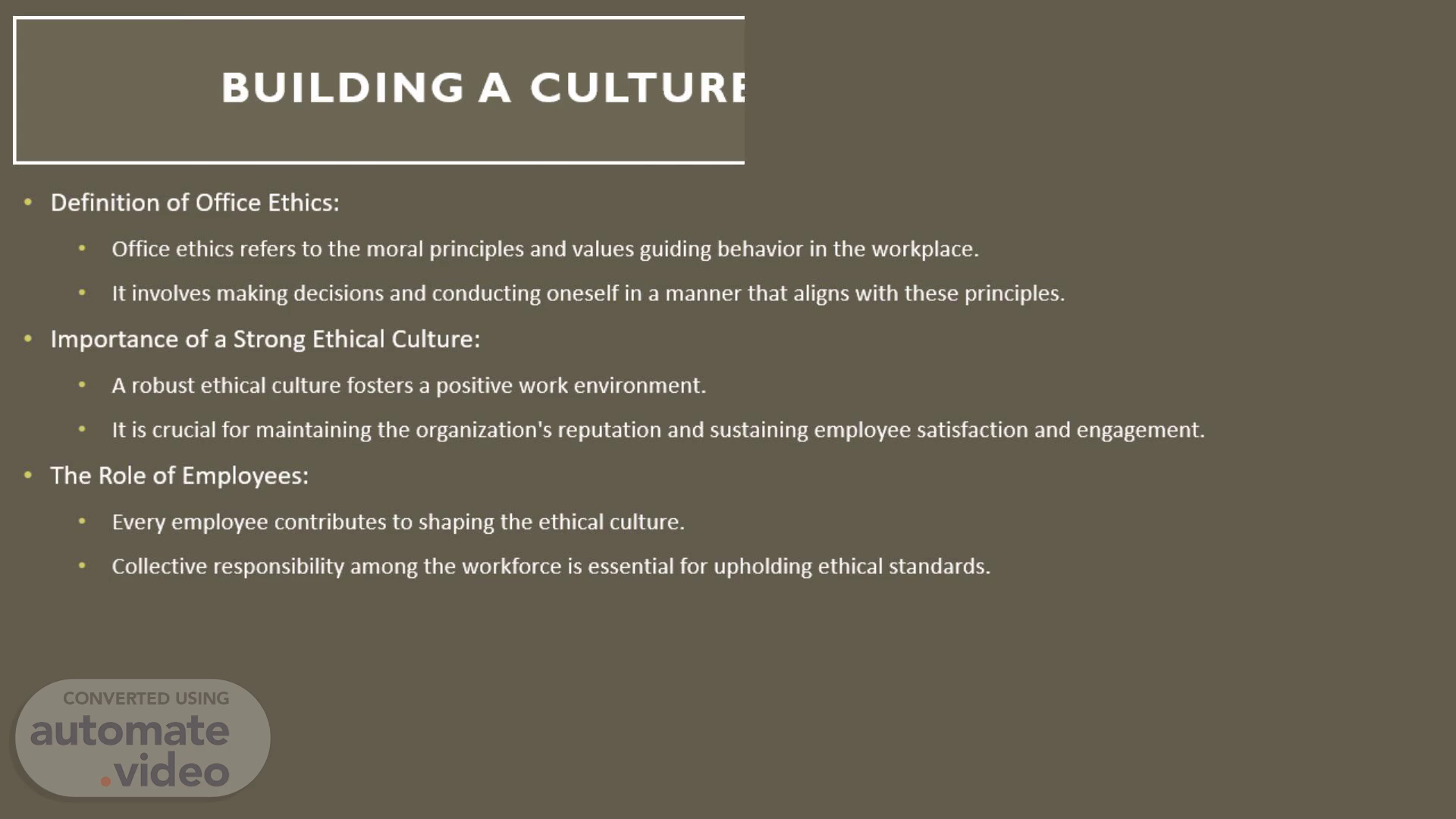
Building A Culture of Office Ethics
Scene 1 (0s)
Building A Culture of Office Ethics. Definition of Office Ethics: Office ethics refers to the moral principles and values guiding behavior in the workplace. It involves making decisions and conducting oneself in a manner that aligns with these principles. Importance of a Strong Ethical Culture: A robust ethical culture fosters a positive work environment. It is crucial for maintaining the organization's reputation and sustaining employee satisfaction and engagement. The Role of Employees: Every employee contributes to shaping the ethical culture. Collective responsibility among the workforce is essential for upholding ethical standards..
Scene 2 (24s)
Key Principles of Office Ethics. Integrity and Transparency: Integrity involves adhering to moral and ethical principles. Transparency is characterized by openness and honesty in communication. Examples: Companies like Patagonia, known for transparent supply chain practices. Respect for Diversity and Inclusion: Inclusive workplaces value diverse perspectives. Examples: Companies like Google implementing diversity and inclusion initiatives. Accountability and Responsibility: Accountability is the willingness to accept responsibility for one's actions. Examples: Companies holding executives accountable for ethical lapses, such as Volkswagen's emissions scandal..
Scene 3 (49s)
Strategies for Fostering Office Ethics. Leadership Role: Leadership sets the organizational tone. Examples: Ethical leaders like Warren Buffett emphasizing the importance of integrity. Communication: Open channels for reporting ethical concerns build trust. Examples: Whistleblower protection programs in companies like Microsoft. Training and Development: Ongoing ethics training enhances decision-making. Examples: Integrating ethical considerations into employee development programs..
Scene 4 (1m 8s)
Maintaining and Reinforcing Ethical Culture. Continuous Evaluation: Regular assessments of the ethical climate are necessary. Examples: Ethical audits and surveys to gauge employee perceptions. Recognition and Rewards: Positive reinforcement sustains ethical behavior. Examples: Recognition programs for employees demonstrating exemplary ethical conduct. Case Studies: Showcase successful organizations with strong ethical cultures. Examples: Highlight companies like Johnson & Johnson with a history of ethical business practices..
Scene 5 (1m 28s)
Conclusion and Call to Action. Summary of Key Takeaways: A strong ethical culture is foundational for a positive workplace and organizational success. Principles such as integrity, transparency, and accountability are essential in shaping this culture. Leadership, communication, and ongoing training play pivotal roles in fostering and sustaining office ethics. Importance of Individual Contribution: Emphasize that every employee has a role in upholding and promoting office ethics. Collective commitment leads to a more resilient and ethical organizational culture. Call to Action: Encourage employees to actively contribute to the ethical culture of the organization. Emphasize the role of open communication, reporting ethical concerns, and continuous self-improvement in maintaining a strong ethical environment. Commitment to Ethical Excellence: Express the organization's commitment to ethical excellence. Reiterate that ethical conduct is not just a set of rules but a shared value that defines the company's identity. Thank you for your attention. Please ask your questions..